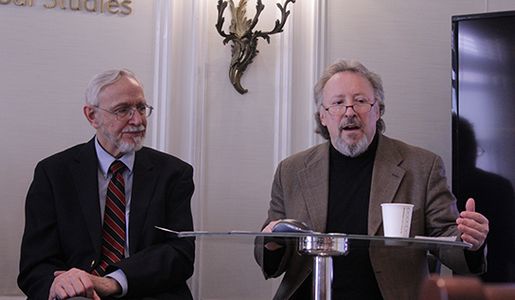BtH: The Long Road to Cuba’s Future
When the students of the future learn the history of Cuba, they’re going to know a very important term; 17-D.
17-D refers to Dec. 17, 2014, the day that President Obama announced that the U. S. would be normalizing diplomatic relations with Cuba. To many viewers, the announcement seemed a bolt from the blue. But according to scholars at a Feb. 5 talk at the Frederick S. Pardee School of Global Studies, the truth is that the groundwork for a thawing of Cuban relations has been laid by decades of secret negotiations.
“Back Channel to Cuba: the Hidden History of Negotiations between Washington and Havana” was the name of both the most recent Beyond the Headlines (BtH) @BUPardeeSchool lecture, and the October 2014 book by William LeoGrande and Peter Kornbluh. Both scholars were in attendance at the event, along with Pardee professors Susan Eckstein and Renata Keller.
Kornbluh, director of the National Security Archive’s Cuba Documentation Project, said that the pre-existing diplomatic blackout had been stuck in a ‘Cold War time warp’ – something well known in Washington.
“When the President made the announcement, he used the ‘F’ word – failure. He said that the United States Cuba policy had been a failure since 1961 on television,” Kornbluh said. “This will go down in history the way opening up China did. But while Obama might be the first President to succeed at changing Cuba policy, he’s hardly the first to try.”
Indeed, Kornbluh pointed to a series of recently-declassified Cuban communiques, attempting to establish relationships with almost every U. S. President from Kennedy to Obama.
“There were three administrations where it seemed really possible that we could see movement. The first, surprisingly, was Kennedy. As Kennedy was being assassinated in Texas, there was an emissary trying to open negotiations with Castro. When he heard the news of the assassination, Castro said, “There goes your mission of peace,” Kornbluh said.
There were further attempts during the Nixon and Carter administrations, but both failed on the grounds of Cuba’s involvement in Africa. And, of course, both presidents Nixon and Carter served during the Cold War – a very different time politically.
The implications of Cuban diplomacy on the U. S. electorate were explored by William LeoGrande, professor of Government at American University and co-author of “Back Channel to Cuba.”
“The political force of conservative Cuban-Americans in Florida had long been something no President wanted to alienate,” LeoGrande said. “But Cuban-Americans have been changing. Second generation Cuban-Americans have more moderate views, and the issue of Cuban relations is no longer the third rail of Florida politics.”
In addition, Latin American disgust with the U. S.’ position on Cuba was beginning to harm the Obama administration in other ways, such as dominating discussions at Summits of the Americas.
Of course, Obama has limited authority to make unilateral changes on a number of issues – he cannot lift the travel ban or embargo without the consent of Congress.
“There’s still a lot to be done,” LeoGrande said. “The test now is if both Barack Obama and Raul Castro, who both have limited time remaining in office, can do enough to convince their countries of the benefits of closer relations so that their work isn’t rolled back when the next administrations come in.”
Keller thanked both authors for attending – and braving the Boston weather.
“This research and discussion was excellent and timely,” Keller said. “We are thrilled to have you here.”
